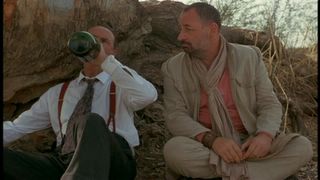Three Movies About Love and Death
Unbelievable though it may seem, I actually watch a lot more movies than I get around to reviewing on the blog. When I first started Crushed by Inertia, I thought it would be a useful way to keep track of everything I was watching - a sort of online, interactive journal of my ongoing cinematic education. I soon found that this wasn't really possible...I just watch too many movies. If I have to not only spend 2 hours watching a movie, but then at least 30 minutes per movie writing about them afterwards, it doesn't leave time for essential life activities like eating and working and, you know, leaving my bedroom.
So I sat down just now to play a little catch-up...Do a couple of quick reviews of some movies I watched and enjoyed this week. And then I realized...all three of the movies are oddly connected. Maybe you could take any three random-ass movies from Laser Blazer and come up with ways to draw through-lines, or maybe it's just a coincidence, but it was kind of interesting nonetheless.
Silver Streak
The passing of comic legend Richard Pryor recently has led a lot of customers at the Blazer to revisit his old films. One that comes up time and again is this 1976 comedy, one I'd seen as a child but only vaguely recalled. It was the first on-screen pairing of Gene Wilder and Pryor (they had worked on the script for Blazing Saddles together, but Pryor ended up not appearing in that film), a duo who would eventually make 4 films of diminishing quality together.
I rewatched it today and the thing holds up really well. It made me actually crack up laughing while watching it alone in my room this afternoon, which is a fairly significant feat. (The only other old comedy I recall watching recently to garner the same response was Midnight Run). It's a deceptively simple premise - converting a Hitchcockian suspense tale set on a train with a farcical comedy.
For the first hour, Wilder navigates the twists and turns of a familiar comic thriller. Riding the train from Los Angeles to Chicago, he meets a beautiful stranger (Jill Clayburgh, quite the looker when she wasn't hopped up on goofballs) and becomes accidentally involved in a plot to keep hidden some valuable letters, written by the painter Rembrandt. In the film's best running gag, he keeps being thrown off the train and having to find his way back on board.
Richard Pryor doesn't appear for the film's first hour, and once he does, the whole movie takes a huge right turn. Up until that point, it's funny and well-written, and Wilder is great as usual, but it's also kind of safe. Unsurprising. Even the ever-reliable Patrick McGoohan (best known to modern audiences as William the Longshanks from Braveheart) is reserved as the villainous Roger Deveraux.
Pryor just doesn't hold back at all. As thief Grover Muldoon, his character has zero motivation to involve himself in the story. His presence in the film violates all the logic and continuity of the movie, and yet his scenes with Wilder are the highlights of the movie. Maybe it's because he brings so much energy to the film, and manic energy is what farce is all about. (Not that Gene Wilder doesn't bring charisma and energy to comedies...you know what I mean.)
Anyway, I'll probably rent Stir Crazy next, as I have never even seen it, and I hear it's a pretty good comedy. We'll see. This one is definitely worth picking up if you only hazily recall it from childhood.
Love and Death
Probably my favorite of Woody's early, silly films, Love and Death strikes me as kind of a turning point in the guy's whole career. It's a broad comedy built around one-liners and Marx Brothers-style comic set pieces, and yet the themes and influences that dominate his later, more serious all appear in some form or another.
As a Russian peasant reluctantly recruited to fight in the Napoleonic Wars, Allen delicately balances slapsticky humor with riffs on Russian literature, Swedish films and German philosophy. It's probably the only movie ever made which includes both a man being shot out of a cannon and a visual reference to Bergman's Persona.
I promised all three of these films would link up, right? Well, Silver Streak finds Gene Wilder risking life and limb to save a woman he just meet from a criminal conspiracy. Love and Death tells of Woody's ongoing romance with Sonya (Diane Keaton) set against the backdrop of horrific 18th Century warfare. And this next film, a French feature from 1981, depicts the odd romance between Rose, a bored and emotionally distant French woman living in West Africa, and a local sheriff in the grip of a homicidal madness.
Coup de Torchon
Ho-ly shit...Bertrand Tavernier's noir-y thriller is brilliant. I can't believe I had never heard of it until this week. It's kind of like Taxi Driver, but French and set in West Africa. Tavernier adapted a story by Jim Thompson - one of America's best pulpy writers of the 40's and 50's - turning the racist American South into the racist French-occupied Africa, and it works amazingly well.
Ineffectual local cop Lucien Cordier (Philippe Noiret) sympathizes with the disenfranchised, poverty-stricken blacks around him, probably because he's so disrespected in his own life. His shrewish wife (Stephane Audran) flagrantly cheats on him, his superior kicks him around and mocks him, and even the slimy local pimps use bribery as an excuse to ridicule him and push him around.
One day, he just snaps. And not in a crazed, mad-dog killer kind of way. It's much creepier than that. He becomes calculating, methodical and careful about his killing spree, taking revenge for perceived slights against himself and basic human decency. The film is endlessly cold, innovative and most of all, unpredictable. Lucien becomes a very dangerous man, and because we've had the film's opening half to get to know and like him, the final twists are particularly chilling.
In a lot of films, the love of a good woman is seen as purifying. But here, Rose's cold detachment, her obvious delight in Lucien's misdeeds, sinks him deeper and deeper into a moral quagmire from which he seems to know he can't escape. The first scene in the film finds Lucien observing local black children filling their bellies with sand, presumably in the hopes of easing their hunger pangs, and he lights a fire for the boys. In the last scene, he spies more desperate youths, and caressing a gun, contemplates killing them. Somewhere along the line, he lost his way...
[For anyone interested, I previously reviewed Tavernier's excellent 1995 thriller Fresh Bait here.]

No comments:
Post a Comment